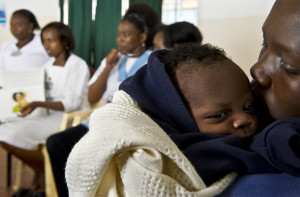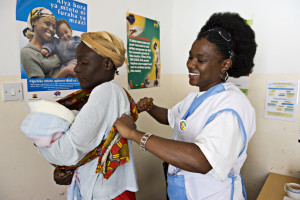An m2m Success Story: Preparing for Post-election Violence in Kenya
On March 4, 2013, droves of Kenyans cast their votes in one of the most anticipated general elections in the nation’s history. It was the first time the country went to the polls since the hotly contested election five years ago that resulted in unprecedented levels of violence, the loss of over 1,200 lives, and difficulties getting the most basic services in the period that followed. mothers2mothers’ (m2m) country office in Kenya was concerned that its HIV-positive clients would not be able to access the critical medicine and support needed to keep them and their babies healthy. To make sure that didn’t happen, m2m set up contingency plans and was the only PMTCT (prevention of mother-to-child transmission) organisation to stay open in the two weeks following the election.
 The lead up to the big day was charged with equal measures of expectation and apprehension. While many prayed for the best, a number of organisations sensitised the public on practical ways of preparing for any negative outcomes. It was in this light that m2m, in partnership with UNICEF Kenya and the Ministry of Health, took steps to develop a proactive plan to provide support throughout March and April at 30 key sites around the country. The preparation was aimed at ensuring continuity of care to HIV-positive clients during the election and period immediately after.
The lead up to the big day was charged with equal measures of expectation and apprehension. While many prayed for the best, a number of organisations sensitised the public on practical ways of preparing for any negative outcomes. It was in this light that m2m, in partnership with UNICEF Kenya and the Ministry of Health, took steps to develop a proactive plan to provide support throughout March and April at 30 key sites around the country. The preparation was aimed at ensuring continuity of care to HIV-positive clients during the election and period immediately after.
“This was an important exercise because there was a lot of displacement of HIV-positive clients and interruption of services during the last election,” states Milker Simba, Senior Programme Manager at m2m. “Some missed their ARVs as a result which is never ideal. The challenge in carrying this out was to ensure that the message was about precaution rather than instilling fear about violence.”
In the months before the election, m2m’s Mentor Mothers:
- Instructed HIV-positive clients to collect a three-month buffer supply of ARVs for themselves and prophylaxis for their babies
- Called all clients whose appointment dates fell during the post-election period to come to the health facility in advance for care and to collect their drug supply
- Participated in the response teams at their health centre to insure that education and psychosocial support was provided to antenatal and postnatal patients at the facility
- Made clients aware of the possible outcomes of the election and how to prepare for potential violence, including making sure they had enough drinking water, food, mobile phone vouchers and that they kept their mobile phones on at all times.
- Educated clients on where to seek healthcare in case of injuries or other illness and in the event that access to their regular facility was blocked because of violence or disruptions
Maureen Olaka, a Mentor Mother Team Leader stationed at Kariobangi Health Centre in one of Nairobi’s low-income areas, prepared clients at her site for the possibility of post-election violence. She recalls what she told clients: “It is always good to be in [a state of] preparedness. These drugs are supposed to help you during and after the election, and should there be any chaos experienced, then you and your child will not lack any medication.” All of the Mentor Mother Team Leaders, including Maureen, gave their clients their personal phone numbers so that they could be reached for advice in the event it wasn’t possible to make it to the facility.
 To the relief of everyone, the election – which was deemed free and fair – was not marred by the carnage witnessed five years ago. Despite having to stand in line for hours to cast their vote, the atmosphere in a majority of polling stations was calm and peaceful, with one of the highest voter turnouts in the nation’s history attributed to efforts made to strengthen Kenya’s democratic process.
To the relief of everyone, the election – which was deemed free and fair – was not marred by the carnage witnessed five years ago. Despite having to stand in line for hours to cast their vote, the atmosphere in a majority of polling stations was calm and peaceful, with one of the highest voter turnouts in the nation’s history attributed to efforts made to strengthen Kenya’s democratic process.
For m2m, the measures the Kenya team took to prepare staff and clients for the post-election period paid off. Mentor Mothers worked the entire two-week period following the election alongside Ministry of Health staff to ensure that services were not interrupted. m2m’s clients had a three month supply of drugs before the election, and Mentor Mothers linked clients who travelled before collecting their drugs with the m2m-support facility closest to where they were going, which strengthened m2m’s referral system.
Three months later, Maureen reflects back on the preparation saying, “It was the right thing to do because the guidance we offered showed clients how to follow up on services in case of anything.” She continues, “I was in touch with other Mentor Mothers who confirmed that some of my own clients who had relocated for the election period had managed to connect with them.”
Through their stable presence at the health facilities during the entire election period, Mentor Mothers served as role models for peace, creating unity among clients and their neighbours. And, most importantly, they gave their clients stability and peace of mind, even when the future of their country was uncertain.






















